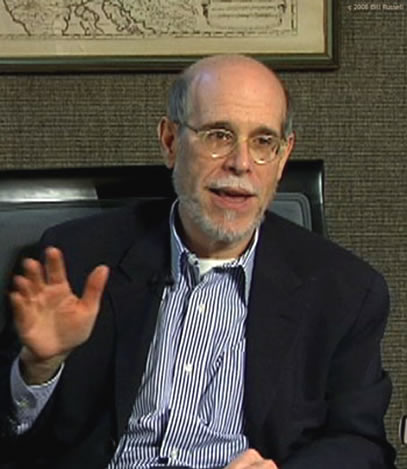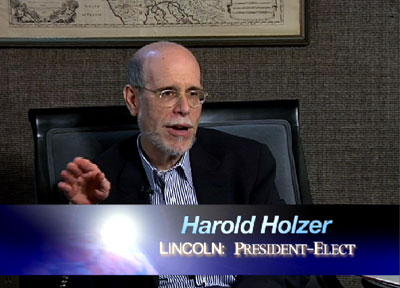 |
Harold Holzer... Lincoln scholar. Author of Lincoln President-Elect: Abraham Lincoln and the Great Secession Winter 1860-1861, Mr. Holzer is also Cochairman of the U.S. Lincoln Bicentennial Commission. He is author or coauthor of thirty books on Abraham Lincoln and the American Civil War, won a Lincoln Prize for Lincoln at Cooper Union, four Barondess Awards, a Nevins-Freeman Award, and three Achievement Awards from the Lincoln Group of New York. He is also senior vice president of external affairs at The Metropolitan Museum of Art in New York City |
“The major difference for us will be that the transition is only 6 weeks, not 4 months,” Mr. Holzer believes. Ratification of the 20th Amendment to the U.S. Constitution in 1933 changed the Presidential inauguration date to January 20.
“Lincoln might not have made it to the inauguration if he didn't do everything pretty much perfectly during (his transition period). Lincoln is now a monument. I think this period is the pedestal -- the monument has to stand on something.”
Until Mr. Holzer reexamined Lincoln’s four month transition period, historians judged Lincoln’s long silence a sign of weakness. Not so, Mr. Holzer found.
“Lincoln’s is a story about positive leadership. Subtle sometimes, but positive and strong. Epochal. History-altering. Nation-saving. I think without this moment in Lincoln's life -- the four months between his election and his inauguration -- we wouldn't have had the more perfect union. He didn't drive wedges, he was affirming. Highly principled. And tough."
Mr. Holzer notes Lincoln's commitment to economic democracy.
“Labor is more important than capital. He said it more than once, and in different ways. There's enough in the literature of Lincoln to say that (he championed) the basic right of a human being to eat the bread that he earns with his own hands. That's the magic economic policy of Abraham Lincoln. It’s so simple. And it’s so right.”
Mr. Holzer suggests lessons to be learned from Lincoln’s dangerous transition.
“If you look at the way Lincoln did his inaugural address, one of the most obvious things is -- if you're angry, if you're resentful, if your campaign has really exhausted you, get all of your anger out with the first draft of your inaugural address. Then tone it down. Tone it down, that's what Lincoln did. He started with a very hot document and he ended with a beautiful, peaceful yet firm document as one observer said.
“Another lesson is, don't say too much too soon. FDR did this, too. He wouldn't do a bank holiday with Herbert Hoover, he just waited until he had the power and the authority as well as the spotlight.
“Pay attention to the symbolism of your cabinet appointments. Today, it’s all about ethnicity and gender, in Lincoln's day it was about geography and party antecedents. What the selection of his chief opponents really shows is political skill.
“Make yourself accessible. You have to pass the test of being exposed and being natural in front of people who are not automatically your supporters.
“There's another lesson. Don't take your hometown with you to Washington. Leave it behind. Lincoln left it. He had them on the train, but then the train metaphorically went back home. He didn't have any of his hometown crowed with him. He was lonely in Washington.
“And be respectful of your predecessor. If you think he's done a terrible job, it’s almost over. Be respectful of the office that you're going to occupy.”
And finally, for those who faulted Lincoln as inexperienced, Mr. Holzer concludes, “Genius is a substitute for experience.”
[This Program was recorded October 10, 2008, in Atlanta, Georgia, U.S.]
audio content:
Conversation 1 |
Conversation 2 |
Conversation 3 |
Conversation 4 |
Conversation 5 |
Conversation 6 |
 6:59 6:59 |
 11:52 11:52 |
 12:18 12:18 |
 11:14 11:14 |
 7:18 7:18 |
 7:10 7:10 |
 |
 |
 |
 |
 |
 |

